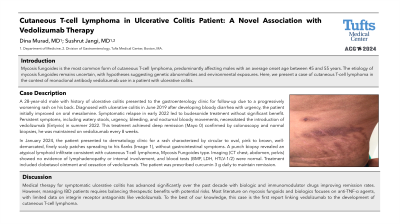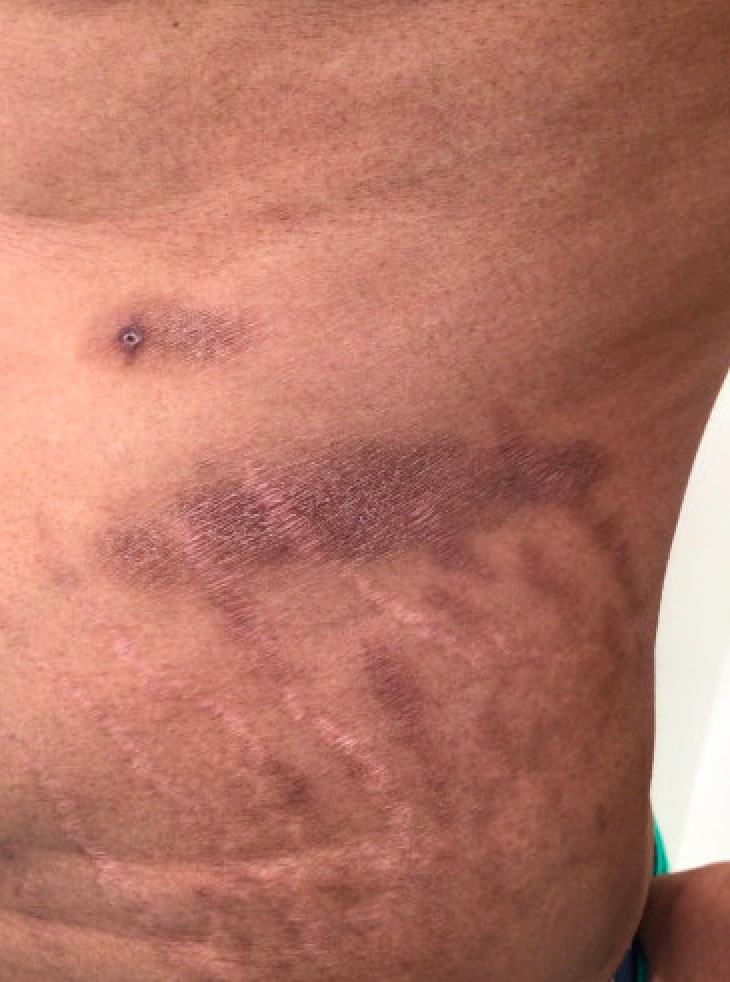Monday Poster Session
Category: IBD
P2718 - Cutaneous T-Cell Lymphoma in Ulcerative Colitis Patient: A Novel Association With Vedolizumab Therapy
Monday, October 28, 2024
10:30 AM - 4:00 PM ET
Location: Exhibit Hall E

Has Audio

Dina Murad, MD
Tufts Medical Center
Boston, MA
Presenting Author(s)
Dina Murad, MD, Sushrut Jangi, MD
Tufts Medical Center, Boston, MA
Introduction: Mycosis fungoides is the most common form of cutaneous T-cell lymphoma, predominantly affecting males with an average onset age between 45 and 55 years. The etiology of mycosis fungoides remains uncertain, with hypotheses suggesting genetic abnormalities and environmental exposures. Here, we present a case of cutaneous T-cell lymphoma in the context of monoclonal antibody vedolizumab use in a patient with ulcerative colitis.
Case Description/Methods: A 28-year-old male with history of ulcerative colitis presented to the gastroenterology clinic for follow-up due to a progressively worsening rash on his back. Diagnosed with ulcerative colitis in June 2019 after developing bloody diarrhea with urgency, the patient initially improved on oral mesalamine. Symptomatic relapse in early 2022 led to budesonide treatment without significant benefit. Persistent symptoms, including watery stools, urgency, bleeding, and nocturnal bloody movements, necessitated the introduction of vedolizumab (Entyvio) in summer 2022. This treatment achieved deep remission (Mayo 0) confirmed by colonoscopy and normal biopsies, he was maintained on vedolizumab every 8 weeks. In January 2024, the patient presented to dermatology clinic for a rash characterized by circular to oval, pink to brown, well-demarcated, finely scaly patches spreading to his flanks (Image 1), without gastrointestinal symptoms. A punch biopsy revealed an atypical lymphoid infiltrate consistent with cutaneous T-cell lymphoma, Mycosis Fungoides type. Imaging (CT chest, abdomen, pelvis) showed no evidence of lymphadenopathy or internal involvement, and blood tests (BMP, LDH, HTLV-1/2) were normal. Treatment included clobetasol ointment and cessation of vedolizumab. The patient was prescribed curcumin 3 g daily to maintain remission.
Discussion: Medical therapy for symptomatic ulcerative colitis has advanced significantly over the past decade with biologic and immunomodulator drugs improving remission rates. However, managing IBD patients requires balancing therapeutic benefits with potential risks. Most literature on mycosis fungoides and biologics focuses on anti-TNF-α agents, with limited data on integrin receptor antagonists like vedolizumab. To the best of our knowledge, this case is the first report linking vedolizumab to the development of cutaneous T-cell lymphoma.

Disclosures:
Dina Murad, MD, Sushrut Jangi, MD. P2718 - Cutaneous T-Cell Lymphoma in Ulcerative Colitis Patient: A Novel Association With Vedolizumab Therapy, ACG 2024 Annual Scientific Meeting Abstracts. Philadelphia, PA: American College of Gastroenterology.
Tufts Medical Center, Boston, MA
Introduction: Mycosis fungoides is the most common form of cutaneous T-cell lymphoma, predominantly affecting males with an average onset age between 45 and 55 years. The etiology of mycosis fungoides remains uncertain, with hypotheses suggesting genetic abnormalities and environmental exposures. Here, we present a case of cutaneous T-cell lymphoma in the context of monoclonal antibody vedolizumab use in a patient with ulcerative colitis.
Case Description/Methods: A 28-year-old male with history of ulcerative colitis presented to the gastroenterology clinic for follow-up due to a progressively worsening rash on his back. Diagnosed with ulcerative colitis in June 2019 after developing bloody diarrhea with urgency, the patient initially improved on oral mesalamine. Symptomatic relapse in early 2022 led to budesonide treatment without significant benefit. Persistent symptoms, including watery stools, urgency, bleeding, and nocturnal bloody movements, necessitated the introduction of vedolizumab (Entyvio) in summer 2022. This treatment achieved deep remission (Mayo 0) confirmed by colonoscopy and normal biopsies, he was maintained on vedolizumab every 8 weeks. In January 2024, the patient presented to dermatology clinic for a rash characterized by circular to oval, pink to brown, well-demarcated, finely scaly patches spreading to his flanks (Image 1), without gastrointestinal symptoms. A punch biopsy revealed an atypical lymphoid infiltrate consistent with cutaneous T-cell lymphoma, Mycosis Fungoides type. Imaging (CT chest, abdomen, pelvis) showed no evidence of lymphadenopathy or internal involvement, and blood tests (BMP, LDH, HTLV-1/2) were normal. Treatment included clobetasol ointment and cessation of vedolizumab. The patient was prescribed curcumin 3 g daily to maintain remission.
Discussion: Medical therapy for symptomatic ulcerative colitis has advanced significantly over the past decade with biologic and immunomodulator drugs improving remission rates. However, managing IBD patients requires balancing therapeutic benefits with potential risks. Most literature on mycosis fungoides and biologics focuses on anti-TNF-α agents, with limited data on integrin receptor antagonists like vedolizumab. To the best of our knowledge, this case is the first report linking vedolizumab to the development of cutaneous T-cell lymphoma.

Figure: Image 1. Cutaneous T-Cell Lymphoma
Disclosures:
Dina Murad indicated no relevant financial relationships.
Sushrut Jangi indicated no relevant financial relationships.
Dina Murad, MD, Sushrut Jangi, MD. P2718 - Cutaneous T-Cell Lymphoma in Ulcerative Colitis Patient: A Novel Association With Vedolizumab Therapy, ACG 2024 Annual Scientific Meeting Abstracts. Philadelphia, PA: American College of Gastroenterology.
